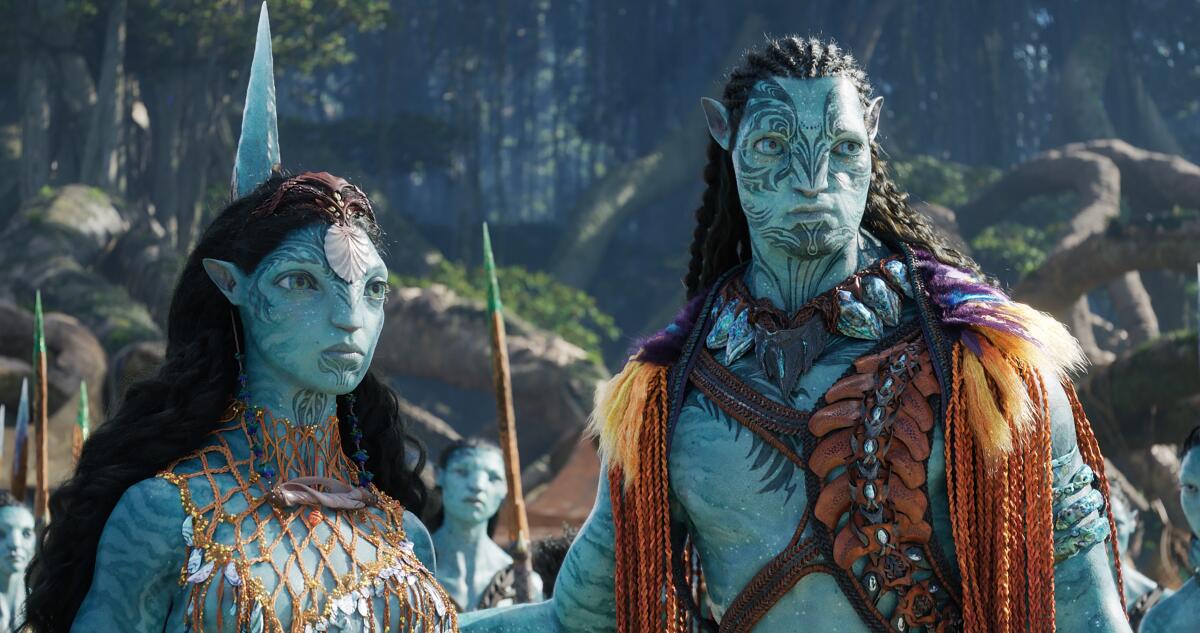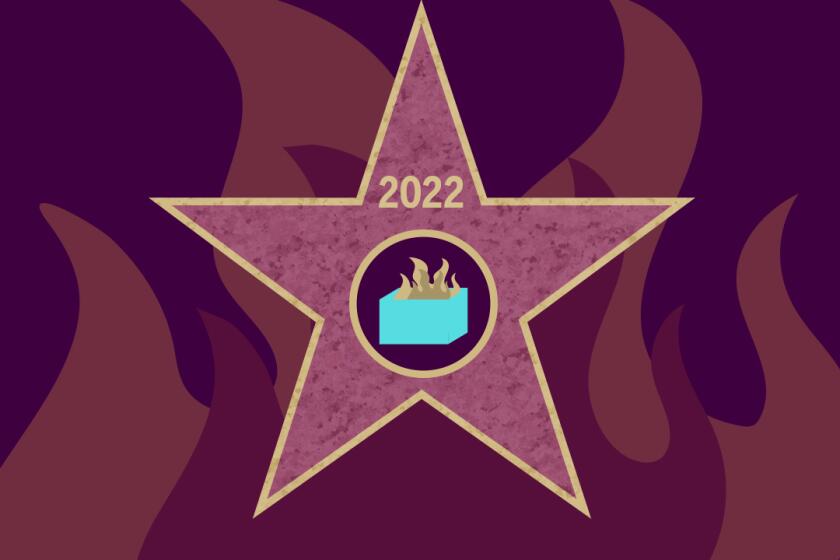‘Avatar: The Way of Water’ won’t save movie theaters. But here’s how it can help

How much pressure is there on “Avatar: The Way of Water” to perform at the box office as it arrives in movie theaters this weekend?
Think of what James Cameron’s submarine endured while exploring the Mariana Trench in 2012. In other words, a lot.
For the Oscar-winning director, the new film hitting theaters Thursday is the realization of five years of production — much of it underwater — and special effects work, coming 13 years after the first “Avatar” set a new standard for blockbusters. For the Walt Disney Co., it’s a revival of what the Burbank entertainment titan hopes will be a long-lasting blockbuster franchise.
And for movie theater owners, it’s a much-needed thirst quencher after a severe dry spell in terms of ticket sales.
A paltry release slate has hampered the box office recovery after high hopes earlier this year.
The last major all-audience hit was “Black Panther: Wakanda Forever,” which was released more than a month ago and has grossed $770 million worldwide. With few popular new releases and a number of high profile flops (Disney’s “Strange World,” Universal Pictures’ “She Said”), the box office hit the skids in recent weeks. Last weekend, the sum total of all movies grossed a bleak of $38 million in the U.S. and Canada in three days, nearly a low for the year.
“There’s a lot riding on it,” said Brock Bagby, chief content, programming and development officer of Liberty, Mo.-based B&B Theatres, the fifth-largest cinema circuit in the U.S., with 529 screens at 57 locations. “If ‘Avatar’ works, our [fourth quarter] is saved.”
The long-awaited sequel, which cost at least an estimated $350 million to produce, has survived dramatic changes in the entertainment business, as well as multiple delays and a transfer of corporate ownership from 20th Century Fox to Disney, with the latter absorbing the former in 2019. Most consequentially, the COVID-19 pandemic in 2020 shut down productions, including Cameron’s in New Zealand, and movie theaters.
“Even when we were allowed to go back to work, the question was... ‘If we get this movie done, are there even going to be theaters to play it in at that point?’” Cameron said while introducing “The Way of Water” at its world premiere in London, according to a video posted on Twitter by Variety. “Tonight is not just about a new ‘Avatar’ film. It’s about the cinema itself.”
Expectations are dizzying. The first “Avatar” remains the highest-grossing movie of all time, not adjusting for inflation. In its original 2009 release, “Avatar” generated $2.74 billion in global box office sales. That total climbed to $2.92 billion after re-releases, including one in China last year, edging out Marvel’s “Avengers: Endgame” for the top spot.
“The Way of Water” hits theaters as Bob Iger begins his own sequel as Disney’s CEO. Plus, MGM’s “Wednesday” is huge for Netflix. Why AMC Networks’ layoffs are a troubling sign.
Cameron has said in interviews that the movie will have to be one of the five highest-grossing films ever to be considered a success. That puts the target at an astronomical $2 billion. Cameron already has two of the top three pictures globally — “Avatar” and 1997’s “Titanic” ($2.2 billion). If “The Way of Water” hits his goal, he’ll occupy three of the top five slots.
“Avatar” has the potential to be the most valuable film property Disney acquired through its $71.3-billion acquisition of Rupert Murdoch’s 21st Century Fox entertainment assets. Disney already has “Avatar 3, 4 and 5” listed on its release schedule through 2028. Even before buying Fox, the company made a theme park attraction from the film’s fictional world of Pandora at its Animal Kingdom in Florida.
Disney did not make executives available to comment for this story.
Pre-sales are strong, according to exhibitors. Advance sales are weighted toward 3-D screenings, which were key to the success of the first “Avatar.” The “Avatar” sequel is expected to gross $150 million to $175 million in ticket sales in the U.S. and Canada from Thursday through Sunday, according to box office analysts, which would make it one of the biggest domestic debuts of the year.
Like its predecessor, “The Way of Water” will have to draw audiences over and over again to reach its goals. The first “Avatar” opened with a mere $77 million in the U.S. and Canada. Luckily for Disney, there’s little competition in the coming weeks.
Big screen provider Imax Corp. has been preparing for this moment for six months, making sure its technology can support Cameron’s specifications, gearing up marketing plans and installing additional theaters, said the company’s chief executive, Richard Gelfond.
“I don’t think the industry realizes how big this is going to be,” Gelfond said. “Not for one weekend, but over the run of the movie.”
Thirteen years after the first ‘Avatar,’ James Cameron finally returns to the distant moon of Pandora in this transporting, radiantly personal sequel.
But theaters are facing issues that even Cameron can’t fix: namely, a lack of films.
During the recovery from the pandemic, exhibitors have been teased with Hollywood movies that have matched and occasionally exceeded blockbusters from pre-COVID days, such as “Spider-Man: No Way Home” ($1.9 billion) and “Top Gun: Maverick” ($1.45 billion).
Still, domestic box office sales so far this year are down 34% from the same time in 2019, according to data firm Comscore, largely because there are fewer big movies in theaters. Lingering effects of pandemic precautions caused a backlog at visual effects companies and led studios to push some titles to next year. Meanwhile, companies have continued to release a number of their movies directly to streaming services, hoping to boost subscription numbers.
So far this year, 67 films have been released on 2,000 or more screens, down 36% from the same period the year before the pandemic, according to the National Assn. of Theatre Owners, a Washington, D.C.-based trade group. The average domestic box office for those titles this year is $89.23 million, similar to the average gross per movie in 2019, the organization said.
Theaters are suffering what’s “clearly a volume issue,” said Eric Handler, an analyst from MKM Partners. It’s a situation that he and cinema operators expect to improve next year as the industry gets closer to a normal rate of releases. Meanwhile, a film like “Avatar: The Way of Water” can expose audiences to trailers for upcoming movies, helping to build momentum.
“One film cannot save an industry, but with a film like ‘Avatar,’ it definitely raises the awareness of the business,” Handler said. “When you have a high profile film like this, it can spur incremental moviegoing.”
All the times we said ‘What a mess’ this year.
There have been skeptics of the movie’s prospects since the sequel was announced years ago. Three-D, once considered the next big thing in film exhibition after Cameron revolutionized the technology, has gone out of style after too many movies were poorly converted to the format. At more than three hours long, its run time could limit the number of screenings and test the audience’s attention span and appetite for repeat viewings.
A common critique touches on “Avatar’s” cultural relevance, or lack thereof: How many people can even name the main character of the original “Avatar,” the way multiple generations of fans know every significant figure in the “Star Wars” universe?
Cameron has answers for the doubters.
“If people are less likely to remember Jake Sully than, say, Luke Skywalker, that’s partly because ‘Avatar’ is only one movie into its mythology,” Cameron told the Hollywood Reporter. “Marvel had maybe 26 movies to build out a universe, with the characters cross-pollinating. So it’s an irrelevant argument. We’ll see what happens after this film.”
Some of those worries have faded in recent weeks and months.
Cameron has a long history of defying long odds with movies like “Terminator 2: Judgment Day,” “True Lies” and “Titanic.” That track record has inspired a studio executive mantra: Never bet against James Cameron.
‘Avatar’ has been derided as the cinematic equivalent of a theme park. But that’s exactly why fans stuck around so long for sequel ‘The Way of Water.’
Reviews have been largely enthusiastic, praising the sequel’s innovative motion capture effects and grand storytelling. According to Rotten Tomatoes, 83% of critics’ reviews are positive.
A hype-building “Avatar” rerelease earlier this year generated an impressive $75.5 million in sales, including $24.7 million in North America. The studio also managed to secure a coveted release date in China, though that market has lately been challenging for Hollywood films. “Wakanda Forever” and “No Way Home” weren’t released there. For movies that do get in, China remains uncertain because of the coronavirus situation in the country.
As for the 3-D issue, audiences coming out of the pandemic have tended to gravitate toward premium formats, hoping to make their experience more of an event worth leaving the house. “The Way of Water” was made with 3-D in mind, not as an afterthought.
According to online ticket seller Fandango, the share of purchases going toward 3-D screenings for “The Way of Water” is the highest for any movie since 2015’s “Star Wars: The Force Awakens.” Bagby said “Avatar: The Way of Water” represented the fourth-highest presale figures for the company since 2018, as of Tuesday. About 60% of presales were for 3-D showings, he said.
When thinking of the three hour-plus run time, Bagby joked that he wished the movie had an intermission so he could sell more popcorn. But he downplayed the extent to which it might dissuade audiences.
“I wish we could get more showtimes in, but I also think that there’s a perceived value of a big spectacle length of a movie like Avatar,” Bagby said.
Besides, it’s not as if there are many other movies competing for his screens.
Parts of this article were adapted from the Wide Shot newsletter, a weekly email about the business of entertainment. Sign up here.
More to Read
Inside the business of entertainment
The Wide Shot brings you news, analysis and insights on everything from streaming wars to production — and what it all means for the future.
You may occasionally receive promotional content from the Los Angeles Times.















